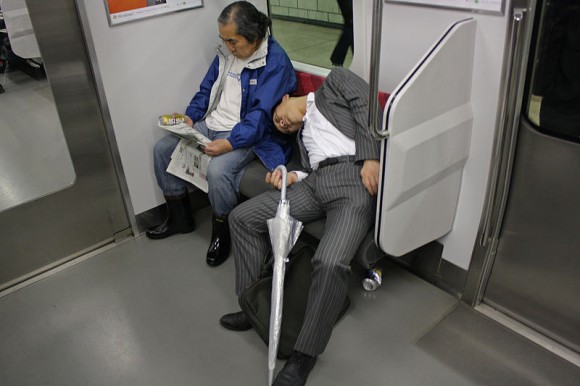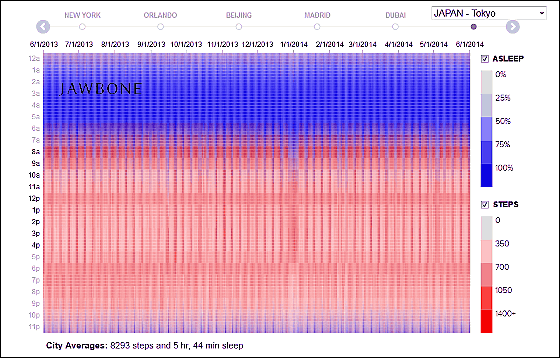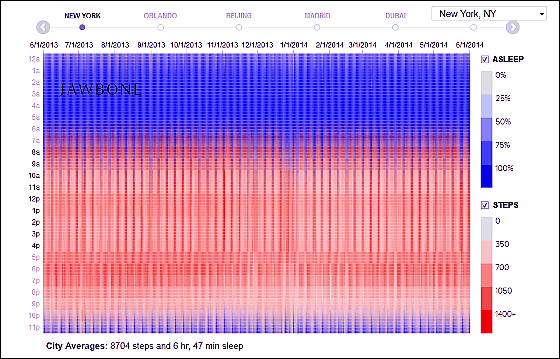
It’s a stereotype about Japan that most people are familiar with – the Japanese work hard, give their lives to the company, and stay at work until after the boss has gone home. It’s a country where karoushi, or death from overwork, is a commonly-used buzzword. While some people might argue that the Japanese don’t actually work any harder than those in the west, it certainly seems that they’re working longer hours than the rest of us.
But as a consequence, how much sleep are they getting?
Here’s what we imagine a day in the life of your stereotypical Japanese salaryman might look like:
6:00am: Get up early to a nourishing breakfast of steaming hot rice and miso soup lovingly prepared by your wife (or, in the case of Japan’s growing number of single herbivorous men, perhaps slurp down the cold remnants of last night’s cup ramen). Shower, dress, etc.
7:00am Ride the crowded subway, packed in like box sushi (sushizume).
8:30am Arrive at work early enough to make sure you’ve already been working for 10 minutes by the time 9am actually rolls around.
9:00-5:00 Work.
5:00-7:30 Overtime (paid if you’re lucky).
7:45-10:00 Drinking party with immediate coworkers.
10:30 Stumble onto last train. Nap. Wake up in time for your stop. Stumble to bed.
…and repeat.
It’s no wonder, then, that the Japanese in Tokyo sleep an average of only 5 hours and 44 minutes per night, according to data collated by Jawbone. Let’s compare that figure to the Australians, who sleep a wombat-tastic 6 hours and 48 minutes a night average in Melbourne. Lest we accuse our Aussie friends of slothfulness, however, it should be kept in mind that people in Brisbane are practically up with the lark – rising at an average of around 6:29 am each morning. But that’s still not early enough to beat the Tokyo salaryman or OL (office lady) – they’re up at around 5:00 am! But why do Tokyoites rise so early? Well, it might have something to do with the fact that most people have a long commute from the suburbs via public transport. As well as factoring in the time spent squeezed into a train carriage, commuters also have to put in quite a bit of legwork as well, averaging 8,293 steps as part of their daily grind!
For comparison purposes, here’s that same graph, showing the sleeping and walking habits of New Yorkers – it seems The City That Never Sleeps actually averages 6 hours and 47 minutes – around an hour more than the folks in Tokyo!
So what do Japan’s twitizens think of this lack of sleep?
▼ “Japanese people really do work too much, don’t they?”
https://twitter.com/pendulum115/status/522022027025072128▼ “Japanese people work themselves to death! So how come we also have such a long life expectancy?! lol (⌒▽⌒) hahaha lol”
【悲報】世界で“最も寝てないのは日本人”と判明、平均睡眠時間はなんと・・・
— 🎮のぶリン🎮@xbox series x (@Xbox_series_x_X) October 14, 2014
死ぬまで仕事の日本人! その日本人が1番の長生きなんですけどねwww (⌒▽⌒)はははwhttp://t.co/P0l5mGCtlT
▼ “Japanese people barely sleep and do the most unpaid overtime. As a result, you get lower productivity and poorer work performance.”
【悲報】世界で“最も寝てないのは日本人”と判明、平均睡眠時間はなんと・・・ : オレ的ゲーム速報@刃 http://t.co/7UHKSodkVv @Jin115さんから
— Five-seveN@3~4月一杯は創作期間にて多忙 (@FiveseveN) October 14, 2014
睡眠時間が短く、労働時間がサビ残込で一番長い日本。
その割には生産性は高くなく、品質も低下する一方。
▼ “Then why not change the labour laws? Do something about the politicians?”
“@Jin115: 【悲報】世界で“最も寝てないのは日本人”と判明、平均睡眠時間はなんと・・・ http://t.co/Tq5nHSQvTI”
— よくお腹を下すONE(音効系・MA目指し) (@haraita_ONE) October 14, 2014
なら労働基準法を変えれば?政治家をなんとかすれば?
▼ “I don’t think this is all down to working longer; I think we just have a lot more opportunities to go out and enjoy ourselves.”
"@Jin115: 200RT : 【悲報】世界で“最も寝てないのは日本人”と判明、平均睡眠時間はなんと・・・ http://t.co/wSDx4Dwbba"
— 🐕ི (@oji__) October 14, 2014
寝てないのは働き過ぎよりも、色んな遊びが充実してるからだと思う
So, what’s to blame for this state of sleeplessness? Is it a byproduct of commuting culture, socially-mandated unpaid overtime, after-work drinking, or something else? All we know is that the Japanese are going to bed later, spending less time asleep, and getting up earlier than anyone else – and for those of us who love our sleep, those are some sad statistics!
Sources: Jawbone, Livedoor News
Images: Wikimedia, Jawbone



 Despite their hardworking image, are the Japanese really just as lazy as the rest of us?
Despite their hardworking image, are the Japanese really just as lazy as the rest of us? Study suggests Japanese workers are deeply distrustful of their employers
Study suggests Japanese workers are deeply distrustful of their employers English reactions to A Day in the Life of a Japanese Salaryman video sadden Japanese netizens
English reactions to A Day in the Life of a Japanese Salaryman video sadden Japanese netizens Recent study once again ranks Japan as the country that sleeps the least
Recent study once again ranks Japan as the country that sleeps the least Top 11 tweets to make you feel glad you don’t work in Japan
Top 11 tweets to make you feel glad you don’t work in Japan Viral Japanese cheesecake from Osaka has a lesser known rival called Aunt Wanda
Viral Japanese cheesecake from Osaka has a lesser known rival called Aunt Wanda Upskirt umbrellas are now a thing in Japan
Upskirt umbrellas are now a thing in Japan Extreme Budget Travel! Can you do a trip to Manila with 50,000 yen (US$333)? – Part 2
Extreme Budget Travel! Can you do a trip to Manila with 50,000 yen (US$333)? – Part 2 What’s on the all-you-can-drink menu at Denny’s Japan? 【Family Restaurant Drink Bar Showdown】
What’s on the all-you-can-drink menu at Denny’s Japan? 【Family Restaurant Drink Bar Showdown】 Japan Extreme Budget Travel! A trip from Tokyo to Izumo for just 30,000 yen [Part 2]
Japan Extreme Budget Travel! A trip from Tokyo to Izumo for just 30,000 yen [Part 2] Starbucks Japan releases first-ever Hinamatsuri Girls’ Day Frappuccino
Starbucks Japan releases first-ever Hinamatsuri Girls’ Day Frappuccino Hello Kitty rickshaw tours are coming to show you Tokyo in Sanrio style!
Hello Kitty rickshaw tours are coming to show you Tokyo in Sanrio style! Hey, 2020s kids! The ’90s have a sticker picture message waiting for you in Tokyo
Hey, 2020s kids! The ’90s have a sticker picture message waiting for you in Tokyo Senkoji: The Japanese temple that’s more like a theme park to heaven and hell
Senkoji: The Japanese temple that’s more like a theme park to heaven and hell Baskin-Robbins Japan’s ice cream popularity poll leaves out fan favourite — but why?!
Baskin-Robbins Japan’s ice cream popularity poll leaves out fan favourite — but why?! Japanese restaurant chain serves Dragon Ball donuts and Senzu Beans this spring
Japanese restaurant chain serves Dragon Ball donuts and Senzu Beans this spring Highest Starbucks in Japan set to open this spring in the Tokyo sky
Highest Starbucks in Japan set to open this spring in the Tokyo sky Tokyo Skytree turns pink for the cherry blossom season
Tokyo Skytree turns pink for the cherry blossom season Japan Extreme Budget Travel! A trip from Tokyo to Izumo for just 30,000 yen [Part 1]
Japan Extreme Budget Travel! A trip from Tokyo to Izumo for just 30,000 yen [Part 1] Yakuzen ramen restaurant in Tokyo is very different to a yakuza ramen restaurant
Yakuzen ramen restaurant in Tokyo is very different to a yakuza ramen restaurant Japan has only one airport named after a samurai, so let’s check out Kochi Ryoma【Photos】
Japan has only one airport named after a samurai, so let’s check out Kochi Ryoma【Photos】 Japanese drugstore sells onigiri at pre-stupid era prices, but how do they compare to 7-Eleven?
Japanese drugstore sells onigiri at pre-stupid era prices, but how do they compare to 7-Eleven? Adorable Totoro acorn key holders come with a special guest hidden inside[Photos]
Adorable Totoro acorn key holders come with a special guest hidden inside[Photos] Japan’s newest Shinkansen has no seats…or passengers [Video]
Japan’s newest Shinkansen has no seats…or passengers [Video] Starbucks Japan releases new sakura goods and drinkware for cherry blossom season 2026
Starbucks Japan releases new sakura goods and drinkware for cherry blossom season 2026 Foreigners accounting for over 80 percent of off-course skiers needing rescue in Japan’s Hokkaido
Foreigners accounting for over 80 percent of off-course skiers needing rescue in Japan’s Hokkaido Super-salty pizza sends six kids to the hospital in Japan, linguistics blamed
Super-salty pizza sends six kids to the hospital in Japan, linguistics blamed Starbucks Japan unveils new sakura Frappuccino for cherry blossom season 2026
Starbucks Japan unveils new sakura Frappuccino for cherry blossom season 2026 Foreign tourists in Japan will get free Shinkansen tickets to promote regional tourism
Foreign tourists in Japan will get free Shinkansen tickets to promote regional tourism The 10 most annoying things foreign tourists do on Japanese trains, according to locals
The 10 most annoying things foreign tourists do on Japanese trains, according to locals Take a trip to Japan’s Dododo Land, the most irritating place on Earth
Take a trip to Japan’s Dododo Land, the most irritating place on Earth Naruto and Converse team up for new line of shinobi sneakers[Photos]
Naruto and Converse team up for new line of shinobi sneakers[Photos] Is China’s don’t-go-to-Japan warning affecting the lines at a popular Tokyo gyukatsu restaurant?
Is China’s don’t-go-to-Japan warning affecting the lines at a popular Tokyo gyukatsu restaurant? Survey asks foreign tourists what bothered them in Japan, more than half gave same answer
Survey asks foreign tourists what bothered them in Japan, more than half gave same answer Japan’s human washing machines will go on sale to general public, demos to be held in Tokyo
Japan’s human washing machines will go on sale to general public, demos to be held in Tokyo Starbucks Japan releases new drinkware and goods for Valentine’s Day
Starbucks Japan releases new drinkware and goods for Valentine’s Day We deeply regret going into this tunnel on our walk in the mountains of Japan
We deeply regret going into this tunnel on our walk in the mountains of Japan Studio Ghibli releases Kodama forest spirits from Princess Mononoke to light up your home
Studio Ghibli releases Kodama forest spirits from Princess Mononoke to light up your home Major Japanese hotel chain says reservations via overseas booking sites may not be valid
Major Japanese hotel chain says reservations via overseas booking sites may not be valid Put sesame oil in your coffee? Japanese maker says it’s the best way to start your day【Taste test】
Put sesame oil in your coffee? Japanese maker says it’s the best way to start your day【Taste test】 No more using real katana for tourism activities, Japan’s National Police Agency says
No more using real katana for tourism activities, Japan’s National Police Agency says Japan’s fourth-biggest prefecture eyes four-day workweek, but will that schedule work?
Japan’s fourth-biggest prefecture eyes four-day workweek, but will that schedule work? Twitter manga shows why “Quit your job” isn’t such an easy solution for suicidal workers in Japan
Twitter manga shows why “Quit your job” isn’t such an easy solution for suicidal workers in Japan “My dad is less useful than our Roomba”—Japanese 5th-grader’s brutal honesty on family in Japan
“My dad is less useful than our Roomba”—Japanese 5th-grader’s brutal honesty on family in Japan Meetings and more meetings: Foreigners list the pros and cons of working at a Japanese company
Meetings and more meetings: Foreigners list the pros and cons of working at a Japanese company Five things that keep Japanese people chained to their jobs
Five things that keep Japanese people chained to their jobs “Extreme going to work” looks to change the way business is done in Japan
“Extreme going to work” looks to change the way business is done in Japan Does Japan really need company drinking parties?
Does Japan really need company drinking parties? Japanese business women who’ve beaten the system 【Women in Japan Series】
Japanese business women who’ve beaten the system 【Women in Japan Series】 42 reasons why we love riding the rails in Japan
42 reasons why we love riding the rails in Japan